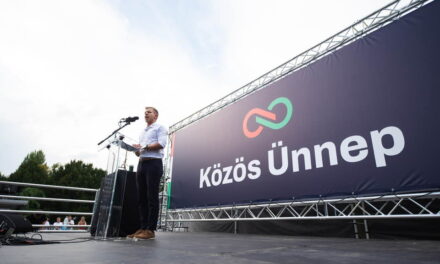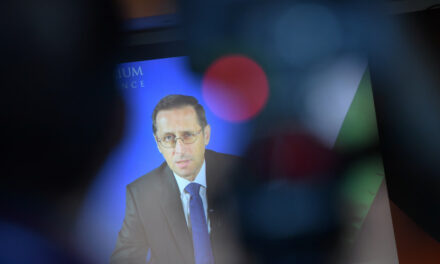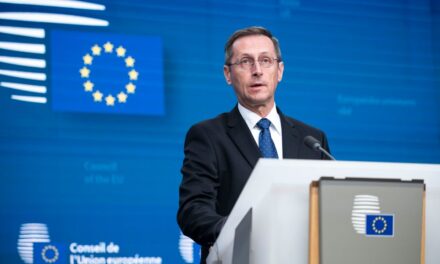The future of Europe depends on the struggle between democracy and autocracy - that is, between us, EU citizens, and our EU leaders.
With the current capacity, the EU would have just enough gas to get to the end of November, warns Thomas Fazi.
Is Europe now on the verge of a new era of energy saving? – asks the question at the beginning of his article by the journalist on the UnHerd site, who also reminds us: the city of Hannover has recently introduced very strict energy saving rules, which include shutting off hot water in public buildings, swimming pools, sports halls and gyms. In addition, the city administration decided to ban mobile air conditioners, heating fans, radiators, turn off public fountains, and stop the night lighting of major buildings, such as the city hall.
And several other European countries have also opted for strictures. In addition, even more drastic measures are being considered - including gas controls for energy-intensive industries such as steel and agriculture. These measures are part of an EU-wide gas demand reduction plan, ominously named
"Let's save gas for a safe winter" and aims to reduce gas consumption by 15% in Europe by next spring.
The prices are already in the sky
Meanwhile, Russia has also drastically reduced the amount of natural gas flowing to Europe in recent months, bringing unprecedented prices to the market.
The market price of natural gas is now 10 times higher than two years ago. And accordingly, the value of electricity has also increased in many countries.
Soaring energy prices are already fueling record inflation - which is currently close to 9 percent and rising further in the EU - which squeezes people's purchasing power and pushes thousands into poverty, Fazi states.
According to him, all this particularly affects Germany, which is almost entirely dependent on Russian gas imports. In fact, the country's industrial production has been shrinking for more than three months. 16 percent of German industrial companies reduced production or partially stopped their activities due to rising energy prices. This helps explain why last month Germany became the first country to raise its gas supply warning to "alert level".
According to Fazi, the situation is made worse by the fact that the European Central Bank's recent decision to raise interest rates will barely or not curb inflation caused by supply-side factors, but it will almost certainly further reduce economic activity, making it more difficult for the states.
It could be worse
According to the journalist, if the situation can now be called bad, then it goes without saying that a further reduction in Russian gas flows, which still account for 40 percent of the EU's gas imports, would have completely catastrophic consequences, not to mention a complete shutdown. Especially if it were to happen in winter, when the demand for gas is the highest.
"Energy is literally the lifeblood of the economy."
It keeps our houses lit and warm (or cool), our cars, industries, supermarkets and electronic gadgets alive. Without it, civilization literally stops, he emphasizes on the UnHerd website.
In order to avoid a doomsday scenario, the EU adopted a regulation according to which the underground gas storage facilities in the member states must be filled to at least 80 percent of their capacity by the end of October (currently 67 percent). However, this depends on a stable flow in the coming months. Moreover, even reaching the 80 percent goal would not be enough for the countries to get through the entire winter without continuous additional gas supply.
At current capacity, the EU would have just enough gas to see it through to the end of November (assuming winter starts on October 1).
EU myopia
According to Fazi, overall it is highly unlikely that Europe would survive a complete shutdown of Russian gas. So in the end, we have no choice but to rely on Putin's benevolence if we want to survive the winter. For this very reason, a "total economic and financial war" against the nuclear-armed regional Russian power can hardly be considered a reasonable step, since it was obvious from the beginning that the severing of European-Russian economic relations would hurt the former much more than the latter - given Europe's dependence on Russian gas .
European leaders indirectly acknowledged this when they excluded Russian oil and gas exports from the sanctions regime.
But Fazi says there is something "pathologically infantile" in the behavior of European leaders:
while they enjoy strutting around the world stage and making grandiose speeches about "democracy versus autocracy," they seem oblivious to the real consequences of their words.
The Russian supply issue is a perfect example of this. At the beginning of the conflict, the EU, which obtained about 40 percent of its gas from Russia before the war, announced that it intended to cut gas imports by two-thirds by the end of the year and to completely withdraw Russian gas by 2027. Indeed, over the past six months, European leaders have boasted that they have "trained" themselves to "hit Putin where it hurts the most."
And yet today they whine about inflation and rising prices - what did they expect? – and panic and moral outrage gripped them when Gazprom announced that it would cut gas supplies to Europe.
“Is Russia using gas flows as a weapon in its tug-of-war with Europe? Of course yes. But the Europeans started this game"
- states Fazi, who at the same time asks the question: maybe European leaders thought that they could wage a one-sided energy war with Russia, according to their own pace and conditions, and therefore excluded Russian oil and gas exports from the sanctions system), without the other side firing back on them?
To make matters even more grotesque, the "gas war" not only did not weaken Russia, but actually appears to have strengthened it by helping Russia significantly increase its foreign exchange reserves due to rising energy prices.
“For all the barbarity of Putin's war, it must be said that the livelihoods of millions of Europeans have already been sacrificed on the altar of the gross incompetence of European leaders.
And the livelihoods of millions more are at risk. However, they are right about one thing: the future of Europe depends on the struggle between democracy and autocracy - that is, between us, the people, and them, the autocrats."
Featured image: Yves Herman, Pool via AP












